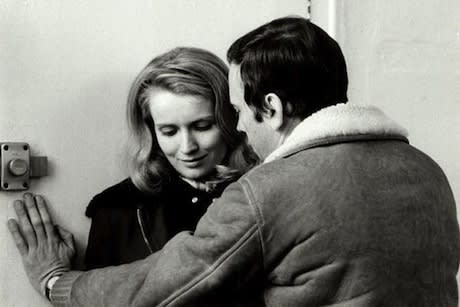The fourth film of Eric Rohmer's Six Moral Tales cycle, Ma Nuit chez Maud, gave the French New Wave director a major boost in stature when it was heaped with critical acclaim upon its release in 1969. And it's easy to see why.
As was the intent of his repeated visitations of the same themes, Rohmer distilled the essence of his philosophical obsessions into a compelling examination of the moral dilemmas forced by principles and religion, thanks in part to the acting talents of Jean-Louis Trintignant (Amour).
A converted Catholic with an interest in the mathematics of probability and a romantic sense of fatalism forms an attachment to a pretty young woman he spots at church, deciding she will become his wife before actually meeting her. Afterwards, he tries to follow her but her bike is more easily able to navigate the narrow streets through which they travel than his car, setting up a dynamic of differences in flexibility that mirrors later developments.
Another chance encounter reunites Jean-Louis (Trintignant) with Vidal, an old chum he hasn't seen in years. They engage in philosophical repartee, mulling over the mathematical odds of probability and chance as they pertain to belief, love and the intrinsic value of life. The ideas of Christian philosopher Blaise Pascal are a major talking point for the characters and an admitted influence on Rohmer's work.
Later on, Jean-Louis's less rigid, and less tactful, friend invites him to visit Maud, a woman he's clearly infatuated with but is self-aware enough to know he's not compatible with. As the three of them continue the pretentious yet eloquent philosophical discourse, Rohmer subtly calls attention to the opposing viewpoints by rarely featuring Jean-Louis in the same shot as Maud and Vidal, who share a more libertarian perspective, even though Vidal identifies as a Marxist and Maud as a Free-Thinker.
This physical separation of ideologies continues after Vidal excuses himself and Jean-Louis and Maud playfully continue their discussion.
As they find common intellectual ground, the camera mirrors their growing intimacy. Maud tests his inflexible, though inclusive, convictions, revealing how base desire can make hypocrites of those with an unyielding, idealistic belief structure.
Rohmer reserves judgement, content to (not so) simply question the concepts of fate versus free will and principles versus emotional honesty. The one constant among all the swirling ideologies is the pointlessness of a preoccupation with the past.
Ma Nuit Chez Maud screens at the TIFF Bell Lightbox as part of the Man and a Woman: Jean-Louis Trintignant and Emmanuelle Riva retrospective at 6:15pm on Friday, January 18th, 2013.
(Pathe Contemporary Films)As was the intent of his repeated visitations of the same themes, Rohmer distilled the essence of his philosophical obsessions into a compelling examination of the moral dilemmas forced by principles and religion, thanks in part to the acting talents of Jean-Louis Trintignant (Amour).
A converted Catholic with an interest in the mathematics of probability and a romantic sense of fatalism forms an attachment to a pretty young woman he spots at church, deciding she will become his wife before actually meeting her. Afterwards, he tries to follow her but her bike is more easily able to navigate the narrow streets through which they travel than his car, setting up a dynamic of differences in flexibility that mirrors later developments.
Another chance encounter reunites Jean-Louis (Trintignant) with Vidal, an old chum he hasn't seen in years. They engage in philosophical repartee, mulling over the mathematical odds of probability and chance as they pertain to belief, love and the intrinsic value of life. The ideas of Christian philosopher Blaise Pascal are a major talking point for the characters and an admitted influence on Rohmer's work.
Later on, Jean-Louis's less rigid, and less tactful, friend invites him to visit Maud, a woman he's clearly infatuated with but is self-aware enough to know he's not compatible with. As the three of them continue the pretentious yet eloquent philosophical discourse, Rohmer subtly calls attention to the opposing viewpoints by rarely featuring Jean-Louis in the same shot as Maud and Vidal, who share a more libertarian perspective, even though Vidal identifies as a Marxist and Maud as a Free-Thinker.
This physical separation of ideologies continues after Vidal excuses himself and Jean-Louis and Maud playfully continue their discussion.
As they find common intellectual ground, the camera mirrors their growing intimacy. Maud tests his inflexible, though inclusive, convictions, revealing how base desire can make hypocrites of those with an unyielding, idealistic belief structure.
Rohmer reserves judgement, content to (not so) simply question the concepts of fate versus free will and principles versus emotional honesty. The one constant among all the swirling ideologies is the pointlessness of a preoccupation with the past.
Ma Nuit Chez Maud screens at the TIFF Bell Lightbox as part of the Man and a Woman: Jean-Louis Trintignant and Emmanuelle Riva retrospective at 6:15pm on Friday, January 18th, 2013.
